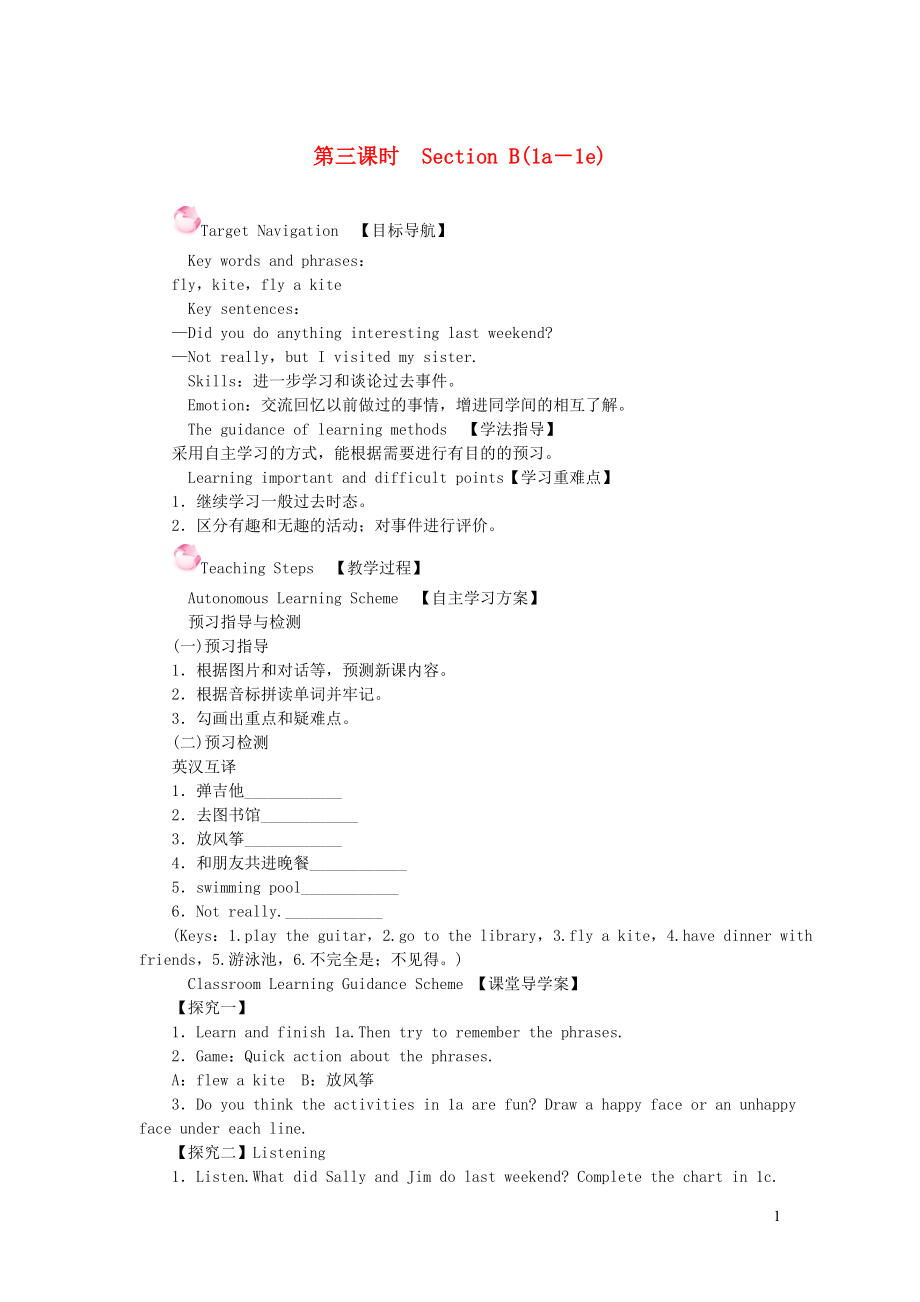《七年級(jí)英語(yǔ)下冊(cè) Unit 12 What did you do last weekend第三課時(shí) Section B(1a-1e)教案(新版)人教新目標(biāo)版》由會(huì)員分享����,可在線閱讀�,更多相關(guān)《七年級(jí)英語(yǔ)下冊(cè) Unit 12 What did you do last weekend第三課時(shí) Section B(1a-1e)教案(新版)人教新目標(biāo)版(3頁(yè)珍藏版)》請(qǐng)?jiān)谘b配圖網(wǎng)上搜索。
1���、
第三課時(shí) Section B(1a-1e)
Target Navigation 【目標(biāo)導(dǎo)航】
Key words and phrases:
fly���,kite,fly a kite
Key sentences:
—Did you do anything interesting last weekend?
—Not really��,but I visited my sister.
Skills:進(jìn)一步學(xué)習(xí)和談?wù)撨^去事件���。
Emotion:交流回憶以前做過的事情��,增進(jìn)同學(xué)間的相互了解�����。
The guidance of learning methods 【學(xué)法指導(dǎo)】
采
2����、用自主學(xué)習(xí)的方式,能根據(jù)需要進(jìn)行有目的的預(yù)習(xí)���。
Learning important and difficult points【學(xué)習(xí)重難點(diǎn)】
1.繼續(xù)學(xué)習(xí)一般過去時(shí)態(tài)��。
2.區(qū)分有趣和無趣的活動(dòng)�;對(duì)事件進(jìn)行評(píng)價(jià)���。
Teaching Steps 【教學(xué)過程】
Autonomous Learning Scheme 【自主學(xué)習(xí)方案】
預(yù)習(xí)指導(dǎo)與檢測(cè)
(一)預(yù)習(xí)指導(dǎo)
1.根據(jù)圖片和對(duì)話等�,預(yù)測(cè)新課內(nèi)容���。
2.根據(jù)音標(biāo)拼讀單詞并牢記����。
3.勾畫出重點(diǎn)和疑難點(diǎn)�。
(二)預(yù)習(xí)檢測(cè)
英漢互譯
1.彈吉他____________
2.去圖書館____________
3.放風(fēng)
3���、箏____________
4.和朋友共進(jìn)晚餐____________
5.swimming pool____________
6.Not really.____________
(Keys:1.play the guitar�,2.go to the library��,3.fly a kite����,4.have dinner with friends��,5.游泳池���,6.不完全是;不見得�。)
Classroom Learning Guidance Scheme 【課堂導(dǎo)學(xué)案】
【探究一】
1.Learn and finish 1a.Then try to remember the phr
4、ases.
2.Game:Quick action about the phrases.
A:flew a kite B:放風(fēng)箏
3.Do you think the activities in 1a are fun? Draw a happy face or an unhappy face under each line.
【探究二】Listening
1.Listen.What did Sally and Jim do last weekend? Complete the chart in 1c.
2.Listen again and check the answers.
【
5��、探究三】 Pair work
Make a conversation with a partner.Talk about what Sally and Jim did last weekend.Then ask what your partner did last weekend.
如:—Who went to the library?
—Sally did.
—Did you do anything interesting last weekend?
—Not really��,but I…
【知識(shí)點(diǎn)撥】
anything interesting意為“有趣的事”���,形容詞intere
6����、sting修飾不定代詞anything應(yīng)后置�,在句中做后置定語(yǔ)。如:
1.他告訴我們一些有趣的事�����。
He told us ________ ________.
2.這并不是什么重要的東西��。
This isn't ________ ________.
注意:不定代詞something一般用于肯定句;anything一般用于否定句��、疑問句和條件狀語(yǔ)從句��。如:
1.你想要一些吃的東西嗎��?
Would you like ________ ________ ________���?
2.你如果想要吃任何東西���,可以給我打電話。
If you want ________ ________ ___
7�����、_____���, call me.
Classroom Evaluation Scheme 【課堂評(píng)價(jià)案】
詳見當(dāng)堂訓(xùn)練部分(即學(xué)生用書同步練習(xí)題)�����。
Teaching Reflection 【教學(xué)反思】
本節(jié)課通過一系列的聽說活動(dòng),讓學(xué)生學(xué)習(xí)掌握重點(diǎn)單詞“fly��,kite,fly a kite”和重點(diǎn)句子“Did you do anything interesting last weekend? Not really��,but I visited my sister.”�。新課標(biāo)要求詞不離句,所以在處理1a的拓展詞匯教學(xué)中�,要根據(jù)學(xué)生真實(shí)的周末活動(dòng),創(chuàng)設(shè)真實(shí)的情境�,結(jié)合本單元所學(xué)功能句對(duì)新單詞進(jìn)行學(xué)習(xí);在1a-1c的聽力訓(xùn)練中�����,要引導(dǎo)學(xué)生聽前瀏覽所給詞匯����,聽中學(xué)會(huì)捕捉關(guān)鍵詞;聽前瀏覽對(duì)話�����,預(yù)測(cè)未知信息����,聽中速記關(guān)鍵詞,聽后復(fù)核的學(xué)習(xí)策略���;通過閱讀表格���,找出需補(bǔ)全的文字信息��,確定考查點(diǎn)���,增強(qiáng)聽音的目的性。
3
 七年級(jí)英語(yǔ)下冊(cè) Unit 12 What did you do last weekend第三課時(shí) Section B(1a-1e)教案(新版)人教新目標(biāo)版
七年級(jí)英語(yǔ)下冊(cè) Unit 12 What did you do last weekend第三課時(shí) Section B(1a-1e)教案(新版)人教新目標(biāo)版

